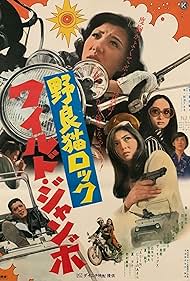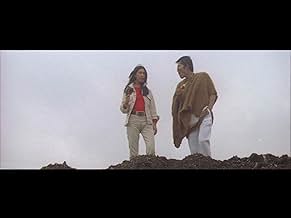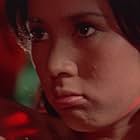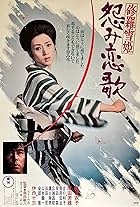IMDb RATING
6.0/10
542
YOUR RATING
Five freewheeling friends conjure up a plan to rob 30 million yen from a religious movement.Five freewheeling friends conjure up a plan to rob 30 million yen from a religious movement.Five freewheeling friends conjure up a plan to rob 30 million yen from a religious movement.
- Director
- Writers
- All cast & crew
- Production, box office & more at IMDbPro
Storyline
Did you know
- TriviaFilmed at the same time, but on different sets, as Stray Cat Rock: Sex Hunter (1970). Meiko Kaji and the Alleycats were shuttled back and forth between the two soundstages, although the male leads all stayed put.
- ConnectionsFollowed by Stray Cat Rock: Sex Hunter (1970)
Featured review
After the popularity of the first Stray Cat Rock movie Delinquent Girl Boss (1970), Nikkatsu Studios were quick to cash in on the hype and produced several sequels that were all released in the same year as the original, except for the last one which came out next year in early 1971. The second movie in the series is called Wild Jumbo (don't ask me why) and remains a very entertaining entry in the rocking franchise.
To me Akiko Wada was the most central actress in the first movie and it is a little disappointing to see she only appears in a tiny cameo in the sequel (reportedly archive material from the first movie), but soon the new actors take the stage with such energy that the past needs not be reminisced any longer, although some actors from the first movie return in different roles. Meiko Kaji (C-ko) and Tatsuya Fuji (Ganishin) are probably the most notable actors of the bunch, but I liked Takeo Chii (Taki), Yusuke Natsu (Jiro) and Soichiro Maeno (Debo) a lot too despite their lack of acting experience at the time.
Storywise Wild Jumbo is a heist film: a group of five friends, also known as the Pelican Gang, spends time hanging out in the city, driving around in their all-terrain buggy car and listening to psychedelic jazz fusion when one of them is approached by a mysterious horse-riding girl named Asako (Bunjaku Han) who suggests they rob 30 million yen from a religious movement called Seikyo Gakkei. The Pelicans – C-ko, Taki, Ganishin, Jiro and Debo – accept the challenge, but things are not as easy as they may initially seem.
The visuals of Wild Jumbo are pronouncedly less psychedelic than in Delinquent Girl Boss and the setting is less urban in general. Instead, a large part of the runtime is spent on a sunny sandy beach surrounded by steep tree-covered mountain slopes. The mood is also more leisurely and comedic than before; the heist plot only gets going in the latter half and at points the movie resembles a carefree beach party flick. Not that there's anything wrong about that, I really liked the gang's antics and the general atmosphere. In spite of a lighter mood, the ending is actually very wistful and sad, as opposed to the more hopeful conclusion of the first movie.
The series has been said to reflect a new direction for the Nikkatsu Studios, which is easy to understand while watching Wild Jumbo. The soundtrack is just as groovy and awesome as before and many unconventional cinematic techniques, such as fast-forwarding, speech bubbles, freeze frames and inverted colours, are utilized at one point or another, evoking allusions to the French new wave. The trickery never feels out of place though; certain aggressiveness in the shooting style is something of a trademark of the series after all. Looking past the surface, the movie doesn't try very hard to ponder the justifications of the gang's plan although it is fleetingly mentioned that Seikyo Gakkei deserves to have their money robbed. Maybe some more substance could have improved the movie a bit, but it is certainly highly watchable as it is now too.
As with so many franchises, the Stray Cat Rock sequels are generally not as well respected as the first film, but in my opinion Wild Jumbo is in no way less entertaining than Delinquent Girl Boss. Both have their strengths (urban grittiness in the first movie, laid-back atmosphere in the second) and personally I enjoy both a lot, so anyone who dug one should give the other a chance as well. The whole franchise would actually deserve more popularity among film aficionados anyway – hopefully the movies can somehow find their way to new viewers.
To me Akiko Wada was the most central actress in the first movie and it is a little disappointing to see she only appears in a tiny cameo in the sequel (reportedly archive material from the first movie), but soon the new actors take the stage with such energy that the past needs not be reminisced any longer, although some actors from the first movie return in different roles. Meiko Kaji (C-ko) and Tatsuya Fuji (Ganishin) are probably the most notable actors of the bunch, but I liked Takeo Chii (Taki), Yusuke Natsu (Jiro) and Soichiro Maeno (Debo) a lot too despite their lack of acting experience at the time.
Storywise Wild Jumbo is a heist film: a group of five friends, also known as the Pelican Gang, spends time hanging out in the city, driving around in their all-terrain buggy car and listening to psychedelic jazz fusion when one of them is approached by a mysterious horse-riding girl named Asako (Bunjaku Han) who suggests they rob 30 million yen from a religious movement called Seikyo Gakkei. The Pelicans – C-ko, Taki, Ganishin, Jiro and Debo – accept the challenge, but things are not as easy as they may initially seem.
The visuals of Wild Jumbo are pronouncedly less psychedelic than in Delinquent Girl Boss and the setting is less urban in general. Instead, a large part of the runtime is spent on a sunny sandy beach surrounded by steep tree-covered mountain slopes. The mood is also more leisurely and comedic than before; the heist plot only gets going in the latter half and at points the movie resembles a carefree beach party flick. Not that there's anything wrong about that, I really liked the gang's antics and the general atmosphere. In spite of a lighter mood, the ending is actually very wistful and sad, as opposed to the more hopeful conclusion of the first movie.
The series has been said to reflect a new direction for the Nikkatsu Studios, which is easy to understand while watching Wild Jumbo. The soundtrack is just as groovy and awesome as before and many unconventional cinematic techniques, such as fast-forwarding, speech bubbles, freeze frames and inverted colours, are utilized at one point or another, evoking allusions to the French new wave. The trickery never feels out of place though; certain aggressiveness in the shooting style is something of a trademark of the series after all. Looking past the surface, the movie doesn't try very hard to ponder the justifications of the gang's plan although it is fleetingly mentioned that Seikyo Gakkei deserves to have their money robbed. Maybe some more substance could have improved the movie a bit, but it is certainly highly watchable as it is now too.
As with so many franchises, the Stray Cat Rock sequels are generally not as well respected as the first film, but in my opinion Wild Jumbo is in no way less entertaining than Delinquent Girl Boss. Both have their strengths (urban grittiness in the first movie, laid-back atmosphere in the second) and personally I enjoy both a lot, so anyone who dug one should give the other a chance as well. The whole franchise would actually deserve more popularity among film aficionados anyway – hopefully the movies can somehow find their way to new viewers.
- random_avenger
- Nov 22, 2010
- Permalink
Details
- Release date
- Country of origin
- Language
- Also known as
- Nora-Neko Rock: Wild Jumbo
- Production companies
- See more company credits at IMDbPro
- Runtime1 hour 24 minutes
- Sound mix
- Aspect ratio
- 2.35 : 1
Contribute to this page
Suggest an edit or add missing content

Top Gap
By what name was Stray Cat Rock: Wild Jumbo (1970) officially released in Canada in English?
Answer

























